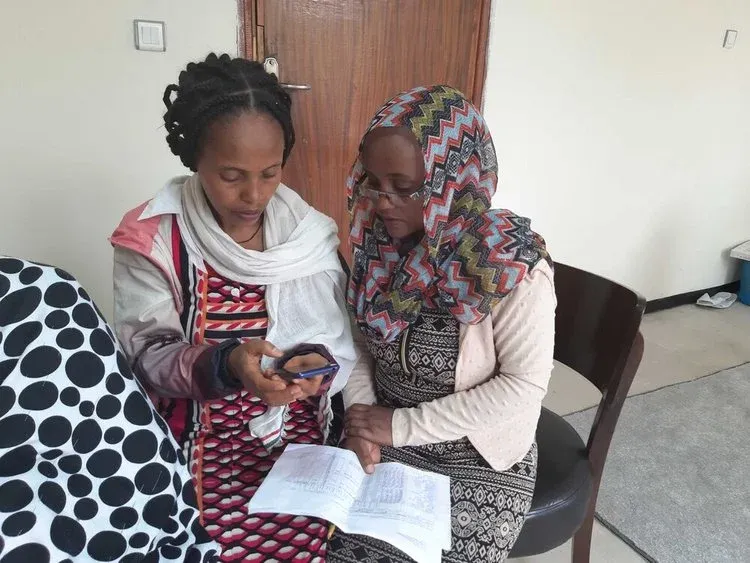Progress for 0 ad
Progress for 1 ad
Progress for 2 ad
Progress for 3 ad


Munir Shemsu
Addis Ababa, Ethiopia

Jamii.One is tapping into traditional Edir institutions to deliver microinsurance to the financially underserved. With an impressive 1 million people onboard, this insurtech startup is bringing financial protection to those who need it most.
____
A Danish-Ethiopian insuretech collaboration is leveraging a centuries-old Ethiopian community tradition to reach millions in financially excluded areas. Jamii.One is utilizing ‘Edir’, a communal funding arrangement where members pitch in small amounts periodically to access funds in times of tragedy, with novel microinsurance services.
Initially founded by a trio of ambitious innovators aiming to provide microloan services to financially excluded groups, the company morphed in response to community feedback.
After working with Edirs nationwide to understand and organize their data registration, bookkeeping, and management practices, Jamii has managed the settlement of around 90 million birr in 900 claims from groups located in all corners of the country through Nib Insurance. It has also facilitated access to insurance services for nearly 160,000. Just recently, the startup managed to onboard an impressive 1 million people.
One of these beneficiaries is Assefa Nega (Maj), chairman of the Jaja 47 General Association in Nifas Silk Laphto District, Addis Ababa. He recalls Layla, one of the promoters of Jamii, approaching him three years ago with what seemed like some bureaucratic government scheme.
“I did not think it would turn out so well for us,” the former soldier told Shega.
Assefa is proud to have participated in a process that provided life insurance coverage to the 568 households within the six-decade-old Association. He says all the 25 families who received claim settlements of 100,000 birr through Jamii escaped imminent financial turmoil.
“Most would have never seen that much money throughout their lifetime,” said Assefa proudly.
Jamii, which translates to community in Swahili, has developed an application available in four local languages operating with an easily manageable interface.
Tigist Bezu, General Manager and Founding Partner, says tailoring the design of the service to the real needs of communities through a bottom-up approach helped in identifying the precise nature of the demand. She emphasizes that their service does not apply to the age, health, or other requirements applied by large insurance companies that often exclude people from qualifying for an insurance product.
“All members of a registered group can qualify,” Tigist told Shega.
She referred to the 85pc retention rate of the company for people who use the service as a demonstration of the deeply embedded demand for insurance products.
Ethiopia has one of the smallest insurance penetration rates in the world, with less than 1pc of the over 120 million citizens being insured. While 18 insurance companies operate in Ethiopia with assets close to 40 billion birr last year, over half of the coverage is either for motor or maritime insurance.
“The figures are quite alarming,” Tigist says.
She recalled initial struggles to find an insurer willing to work with Jamii early on due to the novelty of the product until managing to partner with the two-decade-old Nib Insurance.
The country manager attributes part of the company’s success to the expansion of network coverage, which has made remote areas of the country accessible. As the company aims to reach 40 million people, Tigist notes that this growth in mobile coverage over the past five years has been crucial. She adds that reaching such a vast network, potentially serving tens of millions of individuals, would be unthinkable without technology
Jamii offers life insurance packages ranging from a little over 1,130 birr premiums annually per person, while it settles claims to the tune of 100,000 birr. The startup charges the insurance company a data fee and a percentage of the annual premium for each month or year that users remain with the provider
“Absorbing the financial shock during a time of need is the main goal,” Tigist explained.
A single member of an Edir armed with a smartphone and a pinch of digital literacy can use the mobile application to onboard and expand coverage.
While Edirs traditionally offer financial assistance to members to cover funeral expenses, Jamii seeks to offer a cushion to households missing out on their income due to a loved one’s passing. The company is applying data and telecommunications technology to harness the potential of the existing communal arrangement.
Insurtech is gaining increased attention in Ethiopia, with several startups working to digitize traditional institutions like Edir and Equb, peer-to-peer savings groups. Recently, eQub, a fintech startup digitizing Equb, and HuluCares, a startup focused on providing community-based Idir insurance, were selected for the inaugural Timbuktoo Fintech Startup Accelerator Program.
These two startups were chosen from among 817 applicants across Africa. A total of 42 startups from 31 countries were selected to participate in the program in Lagos, Nigeria.
In addition, BimaLab Ethiopia, implemented by FSD Ethiopia with funding from the Bill & Melinda Gates Foundation, in collaboration with FSD Africa and the National Bank of Ethiopia, is working to empower insurtechs and tackle the distinctive challenges confronted by the Ethiopian insurance sector.
Solomon Bogale, manager of the Nib Amba Edir Association, has observed a massive sense of relief in the 387 members who benefit from Jamii’s package. The 35-year-old association, comprised of residents in Woreda 6 of the Akaki Qaliti District in Addis Ababa, has facilitated support for 10 members.
“The sense of confusion after the loss of a loved one is massively reduced through the packages,” Solomon told Shega.
He says they are preparing to renew the arrangement with Jamii for the fourth time in the coming few months after recognizing the gains with just one- or two-Birr premiums paid out daily. Solomon explained how they collect the premiums throughout the year to limit the financial burden that may accrue from a single, one-time payment.
“We adhere to meticulous bookkeeping procedures,” he says.

The Association is currently considering being part of the new health insurance package being offered by Jamii, which offers cash for medical expenses of up to 20,000 birr for annual premiums starting at 870 birr.
Hospital cash is provided to an insured member of an Edir to minimize the financial impact arising from a potential two-day stay at a health facility.
“A simple proof of hospital admission is all that is required,” the country manager confirmed.
Tigist emphasized the difference between the health insurance packages offered by Jamii from the typical products available in the market.
However, Ethiopia’s insurance sector, which has primarily served an industry segment driven by government-mandated obligations, has largely abandoned microinsurance. With an estimated 40 million Ethiopians organized into burial communities, there is a vast untapped potential for group-based financial products.
Cofounder of the pioneering company Charlotte Rønje (CEO), who has a background in economics, quickly realized that local communities desired financial relief during difficult times upon engaging Edir’s. After four years of serving as a managing consultant at PwC with a focus on helping large businesses transition into holistic sustainability, an entrepreneurial spirit spurred the founder onto a new frontier.
She dove headfirst into understanding the nooks and crannies of the insurance sector to understand what sort of products would best cater to demands coming from communities.
“Several partners helped in the learning process,” Charlotte told Shega.
The ambitious founder, looking to insure 10 million people in the near future, says the most sensible means to expand financial inclusion is through the extensive usage of technology. Jamii engaged with individual Edir’s at a time to create a strong, data-based, and trustworthy foundation.
“If someone you know is benefiting from a product, you are more likely to try it for yourself,” she says.
Charlotte points out how leveraging the power of community and technology allows for a decrease in both administrative and risk costs while enhancing reach and accessibility. While promoters have entered each new town, introducing the product historically, the company’s partnership with the biggest civil society organization in the country (the National Edir Council) is further cementing its position in the community.
Jamii has attracted significant attention from investors over the past few years, with capital raises that included $840,000 via Seedrs last year and a €150,000 grant from the Swiss Capacity Building Facility (SCBF).
Charlotte also relayed the pending development of an impact measuring system to assess the contribution of the company to empowering women.
The CEO also looks to incorporate more affordable insurance products in the future that leverage the community-based approach, which has allowed Jamii to gain a strong foothold in the emerging sector.
Underwhelming insurance penetration in Ethiopia is one of the reasons for the high-risk sensitivity of low-income households, as sudden expenses often lead to a long-term slip into the bowels of poverty. A World Bank study, which surveyed 3000 Ethiopian households, discovered that an alarming 50pc had not even heard of insurance.
Ethiopian insurance industry experts like Assegid Gebremedhin have been calling for the adoption of microfinancial solutions for low-income households for quite some time. He applauded Jamii’s initiative as a trailblazing move that should inspire other entrants.
“An insignificant few have dominated the significant majority in Ethiopia’s financial history,” Assegid told Shega.
He foresees the potential to include agriculture products and livestock into the microinsurance fold by leveraging technology. Assegid echoed sentiments by Jamii’s founders of a decreasing cost structure, improved registration, and even better management of clientele by maximizing the potential of insure-tech.
“There is enormous potential in linking tech with saving collectives,” he underscored.